Cynthia Anderson
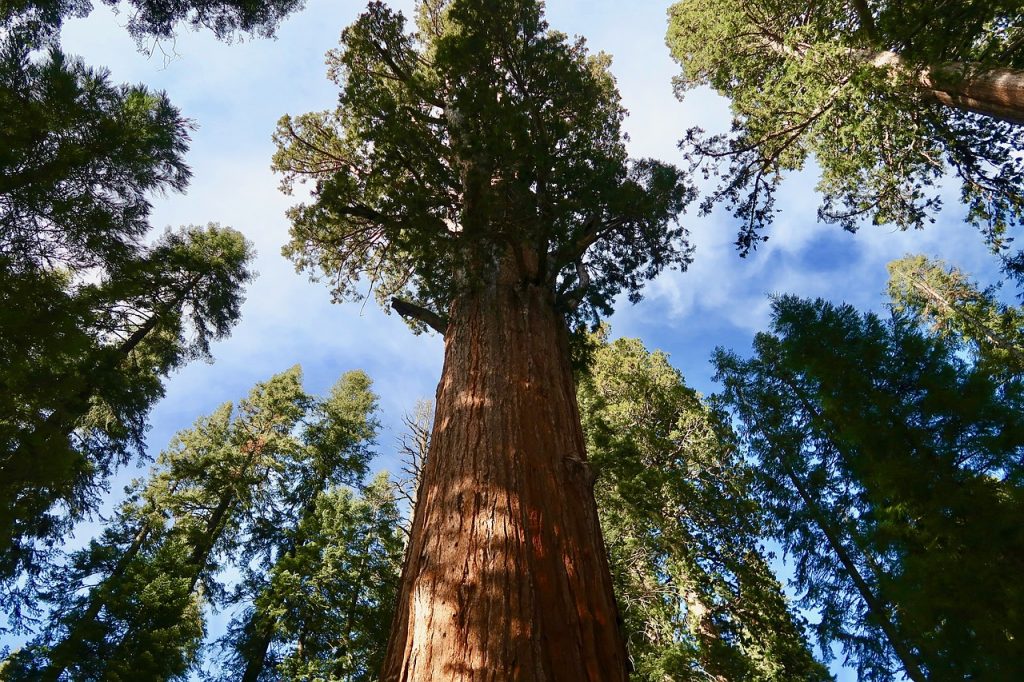 Becoming Sequoia
Becoming Sequoia
To live for thousands of years,
you can’t be perturbed
by every insect or squirrel
or change in the weather.
When wildfire scorches
your skin, you heal and keep
going. Your intention protects
you like an amulet – you push
upward according to plan,
knuckled base nestled
against earth like a fist. You
follow the ways of a shaman,
transmuting air, rock, soil,
water. Your stamina could
build a world from ice.
You have no quarrel with
the sun, or with anyone –
radiating light from trunk
to crown, stretching taller
until one day, gravity takes
you down. Then, you commend
your body to the ground
among seeds already sown
and sprouting, no effort
wasted, birds and stars
sounding your name.
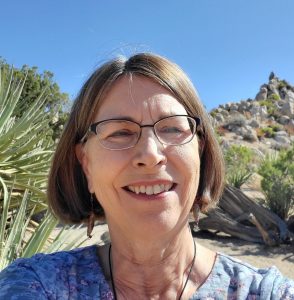 Cynthia Anderson lives in the Mojave Desert near Joshua Tree National Park. A Pushcart Prize and Best of the Net nominee, she has published nine poetry collections, most recently Now Voyager with illustrations by Susan Abbott. She is co-editor of the anthology A Bird Black As the Sun: California Poets on Crows & Ravens and guest editor of Cholla Needles 46. Visit her at www.cynthiaandersonpoet.com
Cynthia Anderson lives in the Mojave Desert near Joshua Tree National Park. A Pushcart Prize and Best of the Net nominee, she has published nine poetry collections, most recently Now Voyager with illustrations by Susan Abbott. She is co-editor of the anthology A Bird Black As the Sun: California Poets on Crows & Ravens and guest editor of Cholla Needles 46. Visit her at www.cynthiaandersonpoet.com
Lawrence Cohen
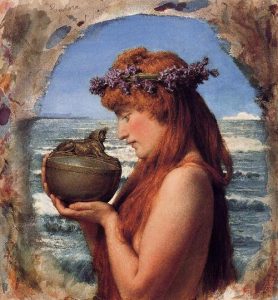 Pandora
Pandora
You know about her box,
So you think you know her.
Well first of all, it wasn’t a box, it was a jar.
An amphora.
So chew on that awhile.
I don’t know what viatical means
But I read it in a poem.
The poem was a gift from God –
If you accept that everything is a gift from – or to –a god –or two.
Shamans and charlatans
Twisting meanings.
Is it a braid, or a dreadlock?
You think you know which I mean to represent hope, and which sorrow.
I’ll spell it out,
I know you turn from ambiguity.
Pandora loosed the ills – it was her nature –
Beautiful Disaster.
No, she was just curious –
“Whatever you do, don’t open that box.”
They must think we’re all toddlers on this bus
And they – the gods – our desperate parents.
So read the Greek myths for revenge,
The sutras for sleep.
Read the Koran for stories of Moses.
We must stick together, with the gods so vengeful.
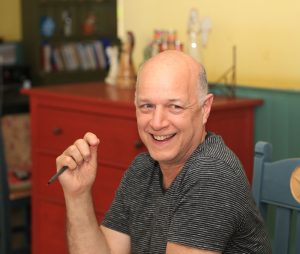 Lawrence Jack Cohen is a psychologist and author. His books for parents, including Playful Parenting and The Opposite of Worry, have been translated into 18 languages. He and his wife have two grown children. They live with their son and granddaughter in Portland, Oregon. Learn more about Larry at playfulparenting.com.
Lawrence Jack Cohen is a psychologist and author. His books for parents, including Playful Parenting and The Opposite of Worry, have been translated into 18 languages. He and his wife have two grown children. They live with their son and granddaughter in Portland, Oregon. Learn more about Larry at playfulparenting.com.
John Laue

At the Zen Garden
– Huntington Museum Grounds
Pasadena, California
Strangely comforting
these single circles
on the still pond’s surface.
They occur like phantoms,
grow, and then are gone.
There’s no apparent cause:
no rocks or raindrops
break the surface tension,
no bubbles from the bottom,
neither koi nor water skaters,
only sky-lit circles
that arise from calm,
subside to calm again.
We leave the place
with no more answers
than we had before,
but more aware of mysteries,
more inclined to let things be.
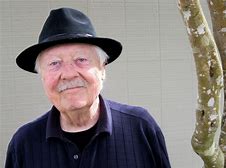 John Laue, teacher/counselor, is a former editor of Transfer, San Francisco Review, and Monterey Poetry Review. He has won awards for his writing beginning with the Ina Coolbrith Poetry Prize at The University of California, Berkeley. With five published poetry books, the last A Confluence of Voices Revisited (Futurecycle Press), and a book of prose advice for people with psychiatric diagnoses, he presently coordinates the reading series of The Monterey Bay Poetry Consortium.
John Laue, teacher/counselor, is a former editor of Transfer, San Francisco Review, and Monterey Poetry Review. He has won awards for his writing beginning with the Ina Coolbrith Poetry Prize at The University of California, Berkeley. With five published poetry books, the last A Confluence of Voices Revisited (Futurecycle Press), and a book of prose advice for people with psychiatric diagnoses, he presently coordinates the reading series of The Monterey Bay Poetry Consortium.
Rebecca Smolen
Intentions
After listening to protein spikes of COVID-19 translated into music by an MIT engineer and colleagues. (https://www.sciencemag.org/news/2020/04/scientists-have-turned-structure-coronavirus-music)
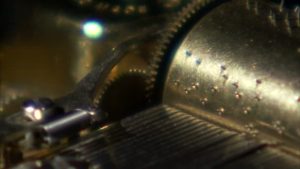 so much limits our sight, how
so much limits our sight, how
our brain has learned to convert that information
into something we can perceive—
but sound? sound can come at us from
all directions, be felt on our skin, through
our bones, even blur our sight without much
effort. when enhanced, the softer chords get
louder, the unheard become known.
as a child, I’d watch the scroll of a music box.
each bulge hooked onto metal fingers, let go &
would sing. mesmerized, I loved the anticipation.
each spike a different size, timed release to
perfection. some had singing bowl resonance.
I’d lay my child-fingers on them to feel
each chord ignite. when my mother would leave
her tweezers out, I’d bounce them on the table,
see how long I could hear their tone;
how long my ear would hold onto it before
it slipped away. I’m sure traumas don’t start
that way, don’t intend for it to hurt.
what if this virus has come to humans with
a less destructive intent, more to hear
its own music? what if its language is more
about compatible survival & a desire to share
the beauty it can hear? Could an understanding
ever feel blameless?
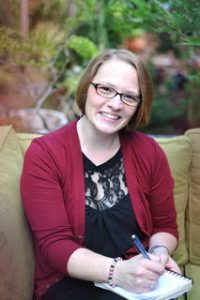 Rebecca Smolen is a Portland-based writer who grew up on a dead-end road in New Hampshire exploring drainage pipes and pond-life. She leads generative writing workshops using the Gateless Method and views writing as a form of healing. Her poems appear in Feminine Collective, Cirque, Tiny Seed, and The Inflectionist Review. Her chapbook, Womanhood and Other Scars, was published by The Poetry Box in 2018 and her full-length collection, Excoriation, is forthcoming this year.
Rebecca Smolen is a Portland-based writer who grew up on a dead-end road in New Hampshire exploring drainage pipes and pond-life. She leads generative writing workshops using the Gateless Method and views writing as a form of healing. Her poems appear in Feminine Collective, Cirque, Tiny Seed, and The Inflectionist Review. Her chapbook, Womanhood and Other Scars, was published by The Poetry Box in 2018 and her full-length collection, Excoriation, is forthcoming this year.

O M G ,LAR
You are so multi talented, it’s hard to keep up with you. I can see your mind hopping from THOUGHT TO THOUGHT….
YOUR SMILING FACE, LIGHTS UP YOUR PICTURE, AS WHEN I PICTURE YOU IT IS WITH THAT WARM LOVING SMILE.
NOW WE HAVE ANOTHER DIMENSION TO YOU.